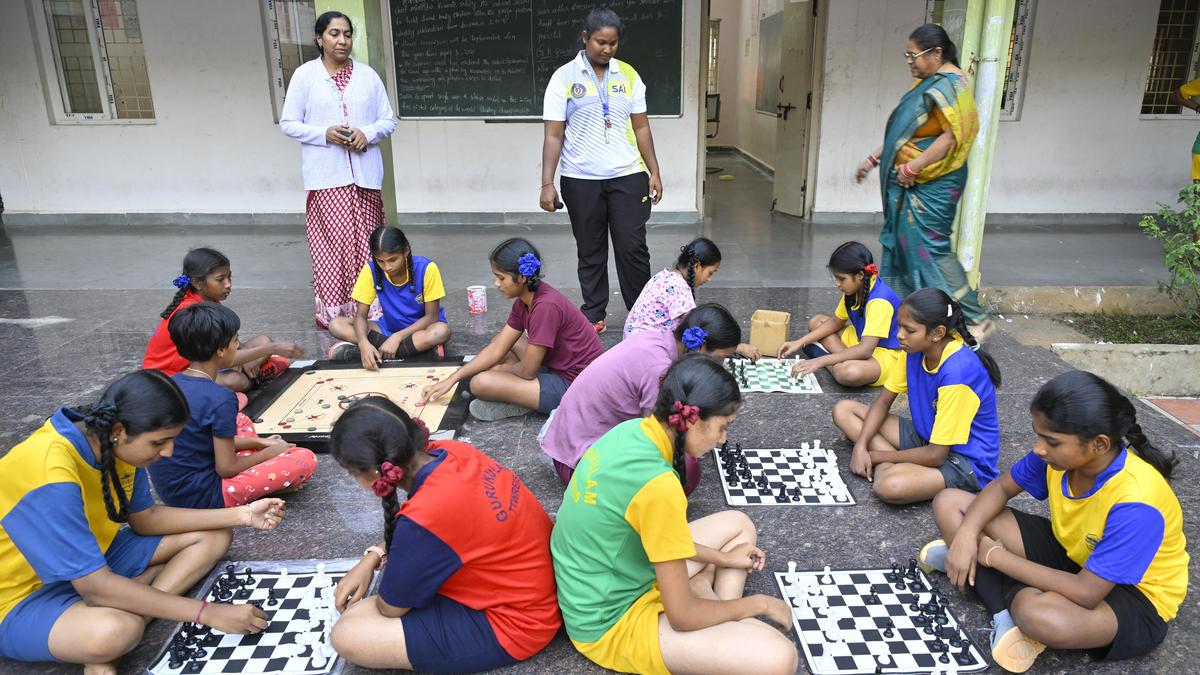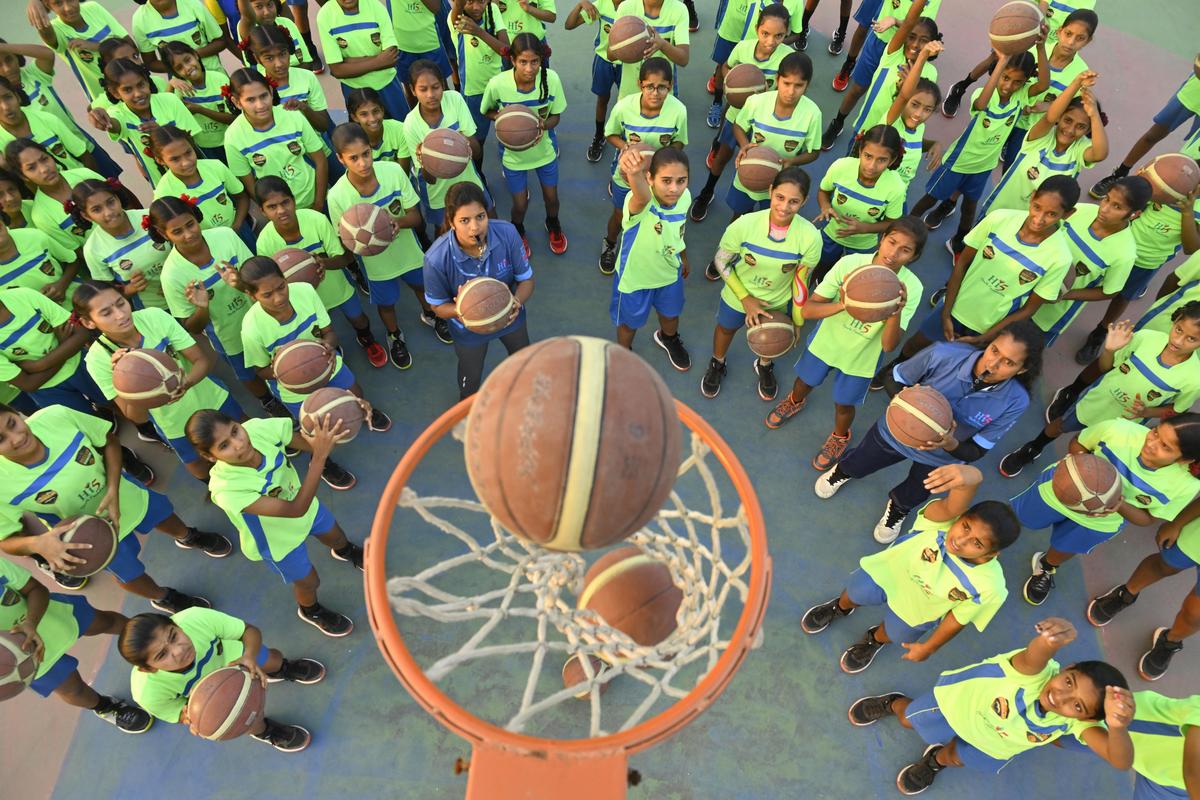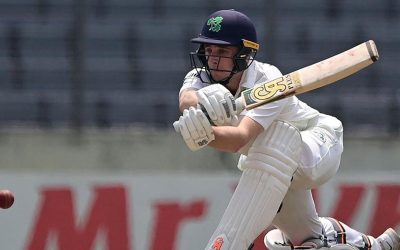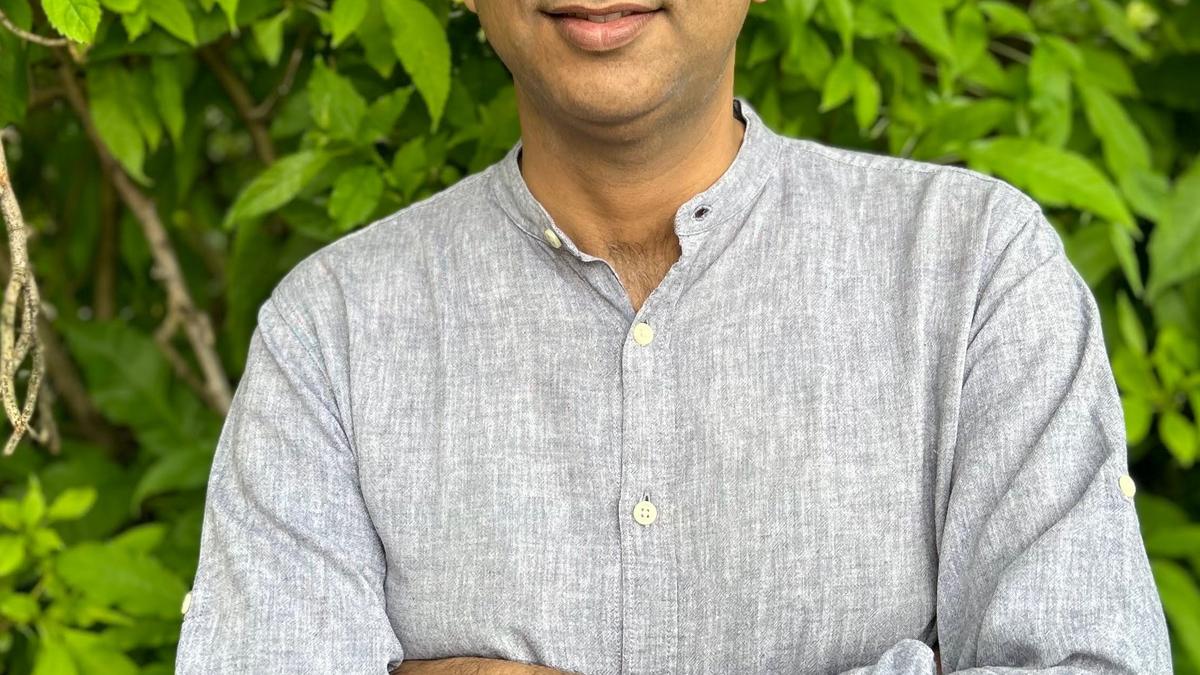Nudging children to swap screens for sports

The classroom falls into a tense hush as Vaishnavi hovers over a rook, her mind flickering through numerous possibilities before her fingers finally move. Until weeks ago, the Class 8 student at the Zilla Parishad High School (ZPHS) in Wazeedu of Telangana’s Mulugu district had long feared even touching a chess board. But today, she spends at least an hour every day returning to the 64 squares, plotting strategies she once thought she could never grasp.
Her confidence grew as she realised she was no outlier; around 70 of the 150 students in Classes 7 and 8 at this government school, located nearly 300 km from Hyderabad near the Chhattisgarh border in a region known for Maoist activity, have been now gathering around the chequered boards daily, turning chess into an unlikely routine on campus.
Using digital boards available on campus, the school’s physical director, Tellam Rajyalaxmi, has been coaching the children consistently. Several players come from the predominantly Koya tribal community, and for many of them, this is the first structured game they have ever learned.
What is unfolding in Wazeedu reflects a small but telling slice of a much broader shift across Telangana, where government schools, colleges and public institutions are steadily embracing chess. This growing interest is largely driven by the Chess Network, a non-profit supported by committed NRIs who view the game as a powerful educational tool that strengthens cognitive skills while steering children away from digital distractions.
“I participated in a chess tournament organised by Chess Network during the Bathukamma festivities in Hanamkonda. At my request, it has provided 10 boards and promised to help with more,” says Rajyalaxmi.
Explaining the motivation behind this initiative, Chess Network founder Sudhir Kodati says the goal is to curb growing cellphone addiction and other ill habits among the youth. “With many students developing unhealthy distractions due to lack of proper guidance, we NRIs with local support are trying to engage them in sports and games,” he explains.
Kodati, hailing from a farmer’s family in Dandepalle village of Hanamkonda district, has been residing in Ottawa, Canada, since nearly two decades. Before launching the chess movement, he set up a Rural Library Foundation to promote reading in villages. With support from fellow NRIs — including Ravi Prakash Mayreddy of the Palamuru NRI Forum and Sierra Atlantic founder Raju Reddy from Nizamabad — Chess Network has taken the game to classrooms and community spaces across Telangana.
Calling the game an integral part of India’s cultural fabric, Sujeeth Reddy Punnam, a California-based cardiologist who is also associated with Chess Network, describes the initiative as a “deeply constructive effort to help youth reconnect with its enduring appeal”.
The organisation plans to distribute 15,000 chessboards to villages across Telangana by the end of this academic year, says Kodati. To deepen interest, it hosted a civic reception for Grandmaster Arjun Erigaisi of Warangal last December. It also trains teachers and conducts tournaments at the university level, with support of government authorities and NGOs.

In the erstwhile Mahabubnagar district, the Palamuru NRI Forum has distributed another 12,000 boards. “The Forum was formed 15 years ago, and remained inactive for some time. We revived it three years ago and have since been actively promoting chess in the combined Mahabubnagar region,” says Mayreddy, who lives in Philadelphia. Originally from a non-descript village in Wanaparthy district, he holds a PhD in Chemistry and has long been involved in service activities, especially in the education sector.
Vimala K., a former teacher at University of Chicago and member of the forum, recounts their work at the Rani Indira Devi Government School in Kollapur, Nagarkurnool district. “Over 500 children attended the special coaching sessions. I have seen a noticeable improvement in their attitudes and learning,” she says.
The initiative has also gained support from district education authorities. In Kamareddy district, chessboards have been supplied to all schools in Ramareddy mandal. “The goal is to nurture a chess culture that keeps students away from harmful habits,” District Education Officer S. Raju says.
Among those contributing to the initiative is Rama Lingampally from Wisconsin Telangana Association in the U.S. During her recent visit to India, she distributed about 100 chessboards to three village schools in the Jammikunta area (Karimnagar). “We also met Peddapalli Collector Sree Harsha Koya, who assured full support to Chess Network’s work in the district,” she says.
As interest grows, the organisation is drawing wider recognition. “The Chicago Telangana Association has come forward to join us. Six American children, all professional chess players, have also expressed interest in participating, both in terms of coaching students and training the trainers,” Kodati shares.
Chess Network is also expanding its presence in junior and degree colleges, including Rajiv Gandhi University of Knowledge Technologies (RGUKT), Basar. Reflecting this momentum, second-year pre-university course student Bharat Parsa says many youth are taking to the game. A chess club was recently launched at the university with support from the network and encouragement of Vice-Chancellor A. Govardhan. “Besides playing every day, I encourage my siblings in Toopran to learn the game,” says Parsa, who spends at least an hour daily at the Student Activity Centre on campus.
According to Kodati, the idea is to train students at institutions such as RGUKT so they can, in turn, coach children in their villages/ native places during holidays. Chess Network recently conducted tournaments on the Basar campus as part of this effort.
Also read | Telangana Budget 2025: ₹465 crore allocated for sports
Cognitive and social development
As concerns rise over screen addiction and digital distractions, chess is finding new relevance as a tool for cognitive, emotional and social development. Hyderabad-based consultant psychiatrist Siva Anoop Yella observes that chess can significantly reduce children’s dependence on social media and online gaming. “Chess improves attention, self control and resilience. In an age when children are vulnerable to screen addiction, it offers a healthy and intellectually enriching alternative,” he says.
In Hyderabad, the movement is finding resonance in the city’s inner pockets as well. The Hyderabad Inner City Basti Sports Academy, in association with Chess Network, recently organised its second sports tournament in Uppal, hoping to steer children in slum communities away from ill habits and towards constructive play. With kabaddi, chess, running and shot-put on the schedule, the event drew more than 600 participants. The academy today operates 30 centres across the city.
The initiative is led by Narendra Cheguri, a Physical Education teacher at a private school, who says the larger aim is to spot talent early and ensure that promising youngsters are not held back by lack of access. The academy now plans to formally register itself and begin supplying sports equipment, jerseys and transportation to children who show potential.
The Basti Sports movement has been drawing appreciation from academics and child-rights advocates. Noted child rights activist Shanta Sinha attended the tournament’s concluding ceremony as chief guest and lauded organisations such as Extra Mile Foundation, Jana Pragathi Seva Charitable Trust and Srivyal Puram Foundation for enabling sports access in vulnerable communities.
Encouraging tribal youth
Beyond Hyderabad’s bastis, similar efforts are strengthening possibilities in tribal belts. Hi5 Youth Foundation and BookASmile are offering basketball coaching through new, modern courts at the Telangana Tribal Welfare Residential Educational Institutions Society (TGTWREIS) Girls’ Sports School in Chegunta, Medak, and at Jinnaram in Sangareddy. Built at a cost of around ₹30 lakh each, these facilities are expected to nurture a new generation of tribal basketball talent.
Part of Hi5’s ‘Hope Thru Hoops’ programme, the project is backed by NRIs like US-based Ram Ramgiri, who says the aim is to equip young players with life skills and a pathway to excellence.

Students of Telangana Tribal Welfare Residential Educational Institutions Society Girls’ Sports School in Chegunta taking part in basketball coaching on campus.
| Photo Credit:
Nagara Gopal
For Dhanavath Sunitha, a Class 9 student at Chegunta, the impact is already visible. Having joined the school in Class 5, she has played at the State level and now believes she can compete nationally. “Thanks to the principal, authorities and the Hi5 Foundation, I feel confident,” she says.
According to officials at TGTWREIS, trained coaches have been appointed at both centres. “So far, 25 students have competed in State-level tournaments and five have played at the national level,” a senior officer notes.
Tribal Welfare Minister Adluri Laxman Kumar says the department has long prioritised sports in residential schools. TGTWREIS launched 20 Mini Sports Academies in 2018-19 across its institutions, covering 12 sporting disciplines and training students from Class 5 to the degree level. The idea is to provide specialised coaching that prepares them for national and international competitions.
The Minister adds that the Society has also set up two dedicated sports schools — one for boys at Eturnagaram and one for girls at Chegunta — within existing institutions. These schools offer advanced coaching, strong infrastructure and expert trainers to help promising athletes rise to the highest levels.
Many sports achievers in Telangana come from modest backgrounds and were shaped by coaches who spotted their promise long before formal systems did. Experts note that the shortage of qualified coaches remains a challenge in several districts, though. However, initiatives such as the Gopichand-Mytrah Foundation are helping bridge this gap by supporting rural athletes through coaching, funding and academic assistance.
“What explains the continued success from Telangana, especially rural parts, is the strong foundation offered by State-run sports schools and the government’s willingness to go the extra mile to help young athletes pursue bigger dreams,” observes veteran sports journalist V.V. Subrahmanyam.
A new sports school, club on cards
A major push to strengthen this pipeline came on November 15 this year with the inauguration of a sports school in Hanamkonda by Sports and Youth Services Minister Vakiti Srihari.
Set up by the Sports Authority of Telangana (SATS), the institution aims to identify and groom promising athletes from the grassroots. It will begin with 80 students and eventually shift to a permanent campus equipped with world-class facilities. The new school will provide specialised training in athletics, gymnastics, wrestling and other disciplines, integrated carefully with academics so that sporting aspirations do not come at the cost of education.
The State government, led by Chief Minister A. Revanth Reddy, has been stepping up its commitment to sports development. Recent initiatives include the Young India Physical Education and Sports University and the Guru Vandanam scheme, which offers accident insurance of up to ₹15 lakh for coaches. It is also exploring enhanced job reservations for athletes who achieve notable success.
SATS chairman K.Shiva Sena Reddy says the CM is also considering establishment of a Sports Club in Hyderabad, modelled on the ones in New Delhi and Bengaluru, which he believes will benefit both current and former athletes.
A skating rink at the Gachibowli Stadium is on the cards as well, following the SATS chairman’s recent visit to a privately-built rink in Bhongir.


